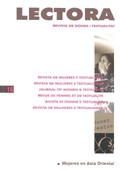Fragmented Encounters, Social Slippages: Lin Huiyin's "In Ninety-Nine Degree Heat"
Palabras clave:
1930s China, Chinese literature, modernism, Lin Huiyin, liuxuesheng, discourses of representation, otherness, social classResumen
The article reads Lin Huiyin’s short story “In Ninety-Nine Degree Heat” (1934) in relation to the context of 1930s China, as an innovative literary work which combines elements from both the Chinese and the Western traditions, and as a text which informs readers not only of the problematic of class and gender issues in 1930s Chinese society but also of the context of the liuxuesheng who returns to China –like Lin Huiyin herself. Focusing on questions like otherness, representation, and encounters, the essay analyzes how the episodic narrative structure of Lin’s short story echoes social and representational discourses in post-May Fourth China, at the same time that it explores issues such as social inequality, otherness and alienation, which were crucial to the liuxuesheng, and which reflect Lin’s own experience as a returned and alienated liuxuesheng at the time.Descargas
Publicado
Cómo citar
Número
Sección
Licencia
Los autores y las autoras conservan los derechos de autoría y otorgan a Lectora: revista de dones i textualitat el derecho de difusión. La obra estará disponible simultáneamente bajo una Licencia de Reconocimiento-NoComercial-SinObraDerivada de Creative Commons que, si no se indica lo contrario, permite compartir la obra con terceros, siempre que estos reconozcan la autoría y la publicación inicial en esta revista.Los autores y autoras son libres de hacer acuerdos contractuales adicionales independientes para la distribución no exclusiva de la versión de la obra publicada en la revista (como la publicación en un repositorio institucional o en un libro), siempre que se reconozca la publicación inicial en esta revista.Se alienta a los autores y autoras a publicar su obra en línea (en repositorios institucionales, temáticos o en su página web, por ejemplo) con el objetivo de conseguir intercambios productivos y hacer que la obra obtenga mayor difusión y citas (véase The Effect of Open Access, en inglés).




